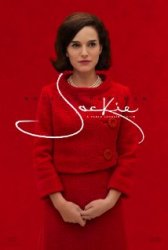Jackie – A Biopic Display of Grief and Its Inhibitor by Willie Jones
 Jackie is a portrait of one of the most important and tragic moments in American history, seen through the eyes of the iconic First Lady, then Jacqueline Kennedy. Jackie places us in her world during the days immediately following her husband’s assassination. Known for her extraordinary dignity and poise, here we see a portrait of the First Lady as she fights to establish her husband’s legacy and the world of “Camelot” that she created and loved so well. This is an R rated film for brief strong violence and some language but we felt it important enough in terms of its historical content to review. We do recommend it for ages 14 to 18. KIDS FIRST! Film Critic Willie J. comments, “Jackie is a biopic about more than Jackie Kennedy. It is a display of grief and its effects on its inhibitor. The assassination of JFK is used as a backdrop to present a portrayal of grief as something raw and gritty.” See his full review below.
Jackie is a portrait of one of the most important and tragic moments in American history, seen through the eyes of the iconic First Lady, then Jacqueline Kennedy. Jackie places us in her world during the days immediately following her husband’s assassination. Known for her extraordinary dignity and poise, here we see a portrait of the First Lady as she fights to establish her husband’s legacy and the world of “Camelot” that she created and loved so well. This is an R rated film for brief strong violence and some language but we felt it important enough in terms of its historical content to review. We do recommend it for ages 14 to 18. KIDS FIRST! Film Critic Willie J. comments, “Jackie is a biopic about more than Jackie Kennedy. It is a display of grief and its effects on its inhibitor. The assassination of JFK is used as a backdrop to present a portrayal of grief as something raw and gritty.” See his full review below.
Jackie
By Willie Jones, KIDS FIRST! Film Critic. Age 17
Jackie is a biopic about more than Jackie Kennedy. It is a display of grief and its effects on its inhibitor. The assassination of JFK is used as a backdrop to present a portrayal of grief as something raw and gritty. The grainy cinematography expresses that. Additionally, the film humanizes a famous figure, that is all too familiar and unfamiliar at the same time.
Natalie Portman plays the famous First Lady and what a transformation it is. Portman’s last great performance was in 2010s Black Swan and she is in rare form in this film. From the walk, to the signature voice, Portman embodies the ticks of Jackie Kennedy that we’ve come to know. That alone is impressive. Then, Portman adds the emotional layers to the caricature we’re accustomed to and Jackie Kennedy suddenly becomes human. Natalie Portman portrays the grief of a famous figure and makes it something down-to-earth and relatable. This performance is one to be remembered for its sensitivity, vulnerability and depth. Behind that voice is a tremble of sadness and beneath those eyes are memories of seeing a husband killed. Natalie Portman gives the performance of her career, not simply because she plays a real person who is a famous figure in history, but because she makes that figure unfeigned.
Supporting her are veterans John Hurt, Peter Sarsgaard, Billy Crudup and Greta Gerwig. Sarsgaard plays JFK’s brother, Bobby Kennedy. His characterization is spot on and his eyes tell a lot. There is a brooding guilt beneath his eyes and in his face that comes out very perfectly played in a scene near the climax of the film. Gerwig and Hurt play the confidants of Jackie Kennedy, each in his own way playing the wisdom and empathy proper to each spectrum of Jackie’s grief. Billy Crudup challenges Jackie’s notion and speaks from a perspective of his search for truth. He truly attempts to uncover and peel the celebrity off of Jackie and give us the raw confession of her lies and motivations.
To further the raw portrayal of grief is the cinematography of Stephane Fontaine and the direction of Pablo Lorrain. The documentarian behind-the-scenes style plays to the fervent nature of the film. The grain of the film, conceivably, could be a testament to the imperfections of Jackie Kennedy. Perhaps the cinematography and, at times, sporadic direction is a representation of how imperfect our idol Jackie Kennedy really was. Furthermore, the editing and cinematography are sometimes very eerie, meaning there are tracking shots that come off woozy and pieces of editing that scatter. They are brilliant pieces of filmmaking because they reflect Kennedy’s mental state. It’s actually quite brilliant how much of Jackie’s emotional state is presented without a word of dialogue, but only with Portman’s face and the direction of Pablo Lorrain.
Personally, my favorite aspect of the entire film is the score by Mica Levi. The score can be described as haunting. It is laced with a foreboding, calamitous tone that injects dread to the film. It drives the grief into our catharsis and, at times, actually weighs down on us. Then, in the midst of the heavy slightly off-pitch stringing, comes a higher pitched sound that injects a sort of longing for something happier. I can’t fully express how beautiful and sad and astute the score is.
My only complaint with this film is very minimal. Sometimes the dialogue gets a little too cinematic for the tone of the film. Additionally, the plot occasionally gets slightly recurring and seems to be a bit lethargic.
With that said, I give this move 4 out of 5 stars and recommend it for ages 14 to 18. This film is in theaters December 2, 2016 so, be sure to go check it out.

